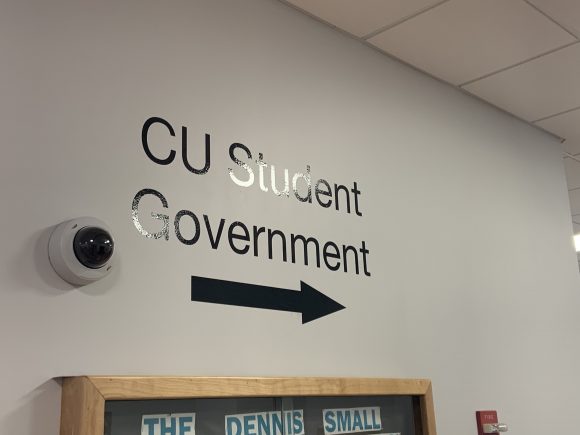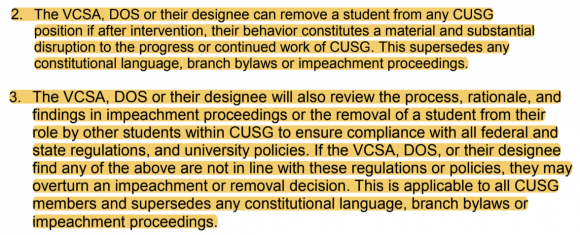
Signage denoting the entrance to CUSG’s offices on the first floor of the UMC. Oct. 15, 2021 (Henry Larson/CU Independent
The legislative branch of the University of Colorado Boulder’s student government will go on strike following months of objections to policies that they call undemocratic and harmful to marginalized groups.
Members of CUSG’s legislative council said that university and student government leadership have created a system in which representatives can be removed from the student government as others see fit. Members of the council also objected to the treatment of minority groups, particularly BIPOC women, by administrative and student leadership.
The president of CUSG’s legislative council, Sophia Khan, said that one of the main issues that prompted the strike was a document signed by the Tri-Executives of CUSG and Chancellor DiStefano behind closed doors.
The revised document, called the “Chancellor’s Agreement”, gives university administrators the authority to remove any member of the student government from office. University administrators can also overturn the results of an impeachment carried out by the organization.
“There were significant changes to the Chancellor’s Agreement without any transparency at all,” said Khan.
CUSG executive branch officials noted in an email that the authority to edit the Chancellor’s Agreement has always been given to the tri-executives, the Vice-Chancellor of Student Affairs and the Chancellor. The officials said that this was inherent to the separation of powers.
Khan said that she was told that there was nothing she could do to alter the agreement and was only able to obtain a copy after the legislative council organized a previous strike earlier in the year.
CUSG executive branch officials dispute this in an email, saying that the Chancellors’ Agreement was always available on the CUSG website and revisions were made publicly available once the amendments were official. You can access this document here.

A portion of the Chancellor’s Agreement contains the most criticized portions of the revisions. VCSA is shorthand for Vice-Chancellor of Student Affairs, who represents the Chancellor in this document. DSA is shorthand for the Division of Student Affairs. (Document courtesy of DiversifyCUNow)
Khan said the issues surrounding the Chancellor’s Agreement are relatively simple to fix, compared to what she calls a larger systemic problem with student government.
“It would be naive to think that these changes didn’t happen because lots of BIPOC women have been speaking out about issues of racism,” Khan said.
In an email, CUSG executive branch officials disagreed with Khan’s claims. They claimed that this decision was necessary because legislative branch members stonewalled other opportunities to negotiate.
Since the end of the Spring 2021 semester, Khan and other women of color have publically voiced their complaints about the way they’ve been treated by CUSG Tri-Executives and the university administration. Many have lodged public complaints about bullying, harassment and microaggressions they’ve faced during their time within the student government.
CUSG executive branch officials in an email also dispute these accusations. They said that they were not made aware of any complaints that have been filed with the Office of Institution Equity and Compliance or the Office of Victims Assistance regarding those complaints against the Executive Branch.
“I don’t know if I feel comfortable telling my BIPOC community to join CU Student Government considering how I’ve been treated,” Khan said.
As far as the strike itself is concerned, the legislative council will continue to fill its obligation to meet every week, but it will stop the processes that allow the two other bodies of the student government to function, effectively crippling the Executive and Appellate Courts of the student government. Both branches oversee millions of dollars in funding for programs that impact students.
“We’re going on strike but we’re taking into account any emergency items that are necessary from joint boards or student organizations,” said Khan.
CUSG executive branch officials noted in an email that this strike has impacted the functioning of Joint Boards and student organizations.
Regent Emeritus Linda Shoemaker authored a letter to Chancellor DiStefano and other university officials expressing her support for the legislative council strike.
“I urge you to recognize the systemic racism on campus, as you have done in the past, and proceed quickly to meet with these students to design a fair public process to discuss their demands, these systemic issues, and recent secret changes to the CUSG/Chancellor Operating Agreement,” Shoemaker said.
“We demand an honest and public conversation where we can be open about the biases each of us carries, and where we can hold ourselves and our organization accountable for the times when we have caused harm,” read a press release issued by activist group DiversifyCUNow and the legislative council late Monday evening.
In a prepared statement, Alessandra Wilson, the Chief Justice of CUSG’s Judicial Branch said that the Legislative Branch had stonewalled the operations of the court since the beginning of the semester.
“The Judicial Branch is committed to being an anti-racist body, and has actively tried to create change. Court leadership has attempted to participate in active discussions with members of the Legislative Council on how we as justices can better hold ourselves accountable. However, we are deeply disappointed that the Legislative Council has refused to have these discussions with us,” Wilson said.
This is a developing story and will be updated.
Correction: A previous version of this article stated that the Tri-Executives of CUSG had the ability to remove representatives from office. Only university officials have the final say in removing CUSG members.
Contact CU Independent Senior News Editor Henry Larson at henry.larson@colorado.edu.
